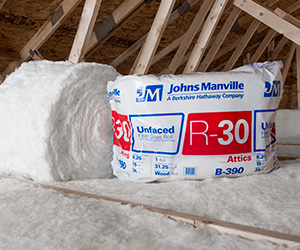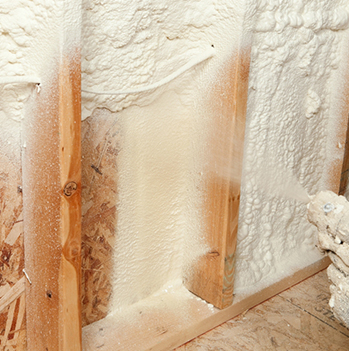Proper home insulation is essential for improving energy efficiency and comfort in Delaware’s climate, where winters are chilly and summers are hot. Insulation acts as a thermal barrier, slowing the flow of heat by resisting heat transfer to keep warm air in during winter and hot air out during summer. The more effective your insulation, the better. That’s where R-value comes in. It’s a crucial term when discussing insulation effectiveness and a key measure of thermal resistance.
And it plays an important role in helping you save 15% or more on your heating and cooling costs with proper insulation and air sealing.

What is R‑Value?
R-value measures an insulation material’s resistance to heat flow. The higher the R-value, the better insulation performance. This rating depends on the type of insulation, its thickness, and density. You can add layers to increase total R-value (two R‑15 layers equal about R‑30). Your R-value needs will vary by the location in your home that’s being insulated, like your attic, wall cavity, or basement, and your designated climate zone.
Recommended R‑Values for Delaware Homes
Every area of the United States is put in a designated climate zone by the Department of Energy (DOE). Delaware is in Climate Zone 4, which is considered a mixed humid zone. Within each climate zone, recommended insulation R-values are given based on the International Energy Conservation Code (IECC). Each state has adopted its own specific energy code requirements based on varying years of the IECC code. Delaware continues to follow the 2018 IECC code that was approved by the state in 2020.
Specific R Value Recommendations
Here’s a breakdown of the current R-values needed for different areas of your Delaware home:
- Attic: R-49 is the minimum needed, but R-60 is the ideal.
- Walls: R‑13 to R‑21 in exterior walls(R‑13 for 2×4, R‑20+ for 2×6).
- Floors/Crawl Spaces: R‑25 to R‑30 for floors over unheated areas.
- Basement/Crawl Space Walls: R‑10 to R‑15 for conditioned crawl spaces.
The Delaware Department of Natural Resources and Environmental Control (DNREC) has been evaluating the 2021 IECC for possible state adoption. If adopted, Delaware’s building code may see increased required R-value levels for newly built homes.
Insulation Types and Their R Values
Air Sealing
Air sealing may not be insulation, yet it is an essential companion. It works alongside insulation to prevent drafts and heat loss in your home by closing the cracks, gaps, and penetrations in your home’s envelope. This is especially important in our humid climate to help prevent moisture issues.
Attic Insulation
Insulate your attic floor or rafters to prevent heat from escaping. Popular and effective types of insulation include blown-in loose fill fiberglass, fiberglass batts, and spray foam insulation. New insulation can often be added on top of undamaged, existing insulation. Attics require a higher R-value of insulation due to their potential for significant heat loss.
Blown‑In Fiberglass
A loose fill insulation, blown-in fiberglass is sprayed into place with a machine. It has an R-value of about R-2.2 to R-3, depending on installation density. It’s excellent for covering large areas and filling irregular spaces and is often used in wall cavities and attics for retrofit projects.
Blown‑In Wall System (Dense‑Pack/BIBS)
With the BIBS method, loose-fill fiberglass is blown into wall cavities and densely packed behind a fabric mesh or through holes. It can achieve higher R-values than standard batts by filling gaps and reducing settling.
Crawl Space Conditioning
Crawl space conditioning treats your crawl space as part of the conditioned interior. The process seals outside vents, adds a vapor barrier onto the ground and bottom half of your walls, and insulates your crawl space walls instead of the floor above with rigid foam board or spray foam. These steps help address our state’s common humidity issues and improve your home’s comfort.
Crawl Space Insulation (Traditional)
This method insulates and air seals your crawl space ceiling in ventilated crawl spaces to increase energy efficiency and improve indoor air quality. A vapor barrier should also be installed on the ground for moisture control. Fiberglass or spray foam insulation is used for the job.
Fiberglass Batts
This familiar insulation comes in rolls or precut panels that must be installed snugly, without gaps or compression, for full effectiveness. It requires air sealing and proper vapor retarder placement when used. It has an R-value of approximately R-3 to R-4.
Foam Board
Rigid foam board panels provide high insulating power for minimal thickness. It’s made of a rigid polyurethane or polystyrene insulation product and is used as a continuous insulation on interior and exterior walls, basements, and roof decks. It’s highly effective at reducing thermal bridging and providing moisture resistance. R-values of rigid foam range from R-1 for ¼ inch thickness to R-15 for 3-inch-thick panels.
Mineral Wool
Mineral wool is made from volcanic basalt rock and a recycled steel-making byproduct called slag. It’s non-combustible, water- and mold-resistant, and offers excellent soundproofing. It has a relatively high R-value at approximately R‑3.7 to R‑4.2 per inch.
Spray Foam
This expanding foam hardens into a solid foam that air seals and insulates. It’s ideal for rim joists, irregular cavities and areas needing both insulating and air sealing. Spray foam insulation comes in two forms: open cell and closed cell. Open cell spray foam has excellent air sealing properties and an R-value of R‑3.4 to R‑4.5 per inch. Closed cell acts as a vapor barrier, adds structural integrity, and has an R-value of R-5.4 to R-7.2 per inch. Spray foam is expensive but is highly effective for challenging spaces.
Wall Insulation
Exterior wall insulation can be installed with different methods and materials, including batts, blown-in, spray foam, or rigid foam panels. In our climate zone, exterior walls need R‑13 to R‑21 or higher of insulation. Continuous insulation, such as foam board can add R‑5+ and reduce thermal bridging. Interior wall insulation is often added for extra comfort and sound control.

Why R Value Alone Isn’t Enough
Insulation and its R-value are very important, but they’re not enough to protect your home on their own. Proper installation matters to ensure your insulation’s maximum effectiveness. Air leaks need to be addressed through air sealing. Moisture concerns should always be considered. Ensure you have proper vapor barriers and ventilation for our humid climate. Insulation is one part of having an energy-efficient home system. It must coordinate with efficient windows, attic ventilation, and your HVAC system.
Maximizing Your Home’s Energy Efficiency
Understanding R-value helps you pick the right insulation products and make informed insulation decisions. Our mixed climate calls for the right R-value in every part of your home to maintain a comfortable living space. Many older homes in our community need upgrades, but more insulation isn’t always better unless you also seal air leaks and control moisture.
At Delmarva Insulation, we’re here to ensure your home is ready for every season. Our expert team is ready to provide you with tailored insulation solutions and quality installation for your Delaware home. Contact us today to learn more about our home energy upgrades.
References
Delmarva Insulation. (2024). How much insulation do Delaware homes need? Delmarva Insulation Blog. https://delmarvainsulation.com/blog/how-much-insulation-do-delaware-homes-need/
U.S. Department of Energy. (2024). Insulation. Energy Saver. https://www.energy.gov/energysaver/insulation
U.S. Environmental Protection Agency. (2024). Insulation R-values. ENERGY STAR. https://www.energystar.gov/saveathome/seal_insulate/identify-problems-you-want-fix/diy-checks-inspections/insulation-r-values
Delaware Department of Natural Resources and Environmental Control. (2021). 2021 IECC changes – residential. https://documents.dnrec.delaware.gov/energy/buildings/2021-IECC-Changes-Residential.pdf
Best Roof Help. (2024). Best attic insulation materials. Best Roof Help Blog. https://bestroofhelp.com/blogs/best-attic-insulation-materials/
Blue House Energy. (2024). Blown-in vs batt: What are the realities? BHE Blog. https://bluehouseenergy.com/blogs/bhe-blog/17211156-blown-in-vs-batt-what-are-the-realities
Rmax. (2024). Rigid insulation R-value. Rmax Blog. https://www.rmax.com/blog/rigid-insulation-r-value
Rmax. (2024). Mineral wool vs spray foam. Rmax Blog. https://www.rmax.com/blog/mineral-wool-vs-spray-foam


